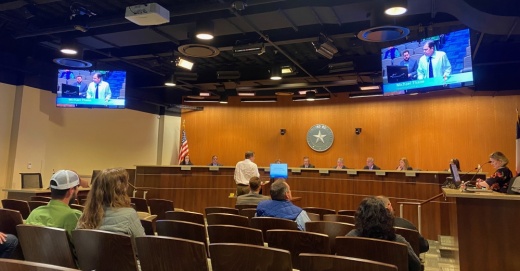While some small cracks have been identified, the city of Round Rock has not yet located the source of excessive inflow that is overwhelming its wastewater treatment plant.
On March 4, the city announced excess wastewater caused the Brushy Creek Regional Wastewater System Treatment Plant to emit more treated effluent into Brushy Creek than permitted to by the Texas Commission on Environmental Quality. Since then, the TCEQ and city testing have determined the water in the creek to be unsafe for public recreational use, and signs have been placed around the creek at public access points.
"Looking at it today, it is still not where we wanted to be, but the plant is looking a lot better with all the modifications we are making," Thane said. "We will continue to do whatever it takes on our plant's operation until we can figure out where this inflow's coming from."
Similar to the March 8 packet briefing, residents questioned whether the TCEQ requirements were strict enough to prevent excess total suspended solids from making their way into the creek when in compliance. Residents close to the creek said they avoid bringing children or pets there because they have noticed a visible change in the water quality since February 2021. One resident, Arlen Zander, speculated the water quality had been poor long enough to cause infections in humans and dogs who played in it.
"Thank you for agreeing to post the signs, but you may be a bit late," Zander said. "I've already talked to one father who said his son may have gotten an infection from wading in the creek. Last summer, I lost a beloved family dog to an intestinal disorder that may or may not have come from the water she drank from the creek."
In February 2021, the plant was overwhelmed with wastewater and sludge due to Winter Storm Uri, Thane said, and the plant received a violation from the TCEQ at that time, based on the quality of water described by these residents.
City water operations noted inflow increases sporadically beginning in May 2021, a city report stated. Organic solids, also referred to as "total suspended solids," passed through the plant's clarifiers to Brushy Creek during peak hours. The creek has since been inspected daily by city staff, and TCEQ officials have visited the plant on multiple occasions to confirm its compliance. The plant had been in compliance up until the last week, when intake levels dramatically increased.
Thane said the city's recent growth is not the cause of the increased inflow, as that can be accounted for based on the number of permits issued. The inflow volume is exceeding a reasonable amount for issued permits, he said. However, the department is examining whether construction near the city's larger wastewater interceptors might be a factor.
Mayor Craig Morgan assured several audience members that the council had already committed to using all available resources to rectify the issue as soon as possible and will possibly revisit the amount of permitted suspended solids down the line.
"Nobody wants to see this fixed as much as anyone up here," Morgan said.





